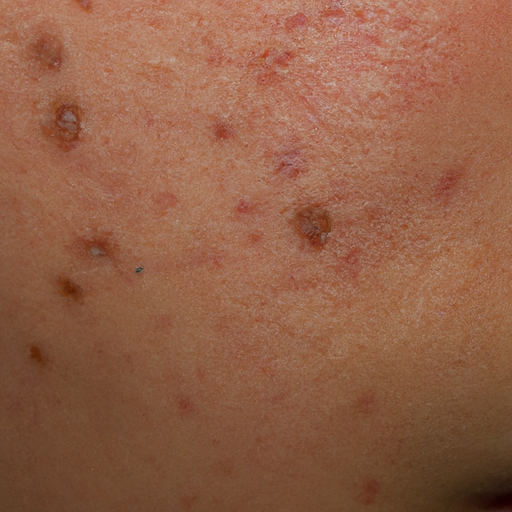Title: Unmasking Acne: A Dermatologist’s Deep Dive into Symptoms and Causes
Acne is a common skin condition that affects millions of people worldwide. As a dermatologist, I often encounter patients who are desperate to understand the causes and symptoms of acne, hoping to find effective solutions. This article aims to unmask acne, providing a comprehensive understanding of its symptoms and causes.
Acne primarily affects areas of the skin with a high number of oil glands, including the face, upper part of the chest, and back. The severity of acne can range from mild to severe, and it can lead to emotional distress and skin scarring.
Symptoms of Acne
The most common symptom of acne is the appearance of pimples on the skin. These can be categorized into non-inflammatory and inflammatory lesions. Non-inflammatory lesions include blackheads (open comedones) and whiteheads (closed comedones). Inflammatory lesions include papules (small red bumps), pustules (red bumps with white centers), nodules (large, painful lumps beneath the surface of the skin), and cysts (large lumps filled with pus).
In addition to physical symptoms, acne can also have psychological implications such as low self-esteem, depression, and anxiety due to its impact on appearance.
Causes of Acne
Understanding the causes of acne is crucial in its treatment and prevention. Acne occurs when your hair follicles become plugged with oil and dead skin cells. This creates an environment where a bacterium called Propionibacterium acnes can thrive, leading to inflammation and acne.
Several factors can contribute to the development of acne:
1. Hormonal Changes: Hormonal fluctuations during puberty or pregnancy can increase sebum production, leading to acne. Hormonal changes due to conditions like polycystic ovary syndrome (PCOS) can also cause acne.
2. Diet: Certain dietary factors, such as consuming dairy products or carbohydrate-rich foods, may trigger acne in some individuals.
3. Stress: While stress doesn’t directly cause acne, it can worsen the condition in people who already have it.
4. Medications: Certain drugs, including corticosteroids, lithium, or testosterone, can cause acne.
5. Genetics: If your parents had acne, you’re more likely to develop it too.
Prevention and Treatment
While acne cannot always be prevented, there are steps you can take to manage your symptoms. These include maintaining a regular skincare routine, using oil-free cosmetics, and avoiding picking or squeezing pimples which can lead to scarring and infection.
Various treatments are available for acne, ranging from topical treatments (creams, gels, lotions) to oral medications (antibiotics, retinoids). In severe cases, procedures such as light therapy or chemical peels may be recommended.
In conclusion, acne is a complex skin condition with various symptoms and causes. Understanding these can help in managing the condition effectively. If you’re struggling with acne, it’s essential to consult a dermatologist who can provide a personalized treatment plan based on your specific needs.
Remember, everyone’s skin is unique, and what works for one person may not work for another. So don’t lose hope if you haven’t found the right treatment yet. With patience and persistence, clearer skin is achievable.
Keywords: Acne, Symptoms of Acne, Causes of Acne, Dermatologist, Skin Condition, Treatment for Acne, Prevention of Acne.



